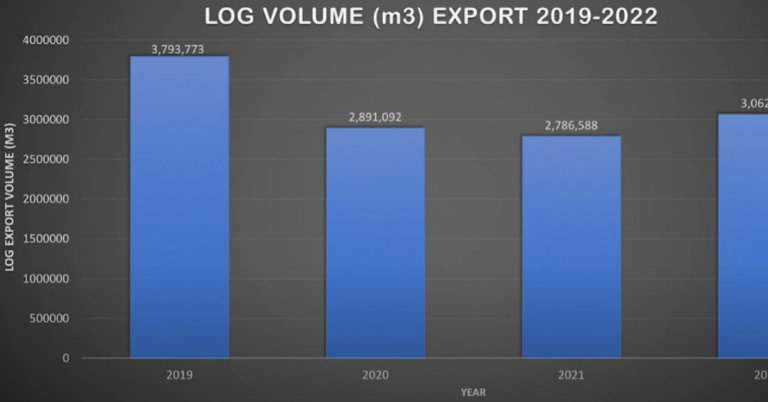Papua New Guinea (PNG) continues export logging at an unsustainable rate, falling short of the government’s reduction targets, according to ACT NOW!, a community advocacy group. The group’s analysis of official data reveals that the PNG Forest Authority has not been able to maintain export volumes within the limits set by the government.
Prime Minister James Marape has consistently spoken of his government’s goal to eliminate all round log exports by 2025. Instead, Marape has urged the forest industry to shift their focus to downstream processing and value addition. This change is projected to increase employment, generate more export revenues, and help PNG uphold its international commitments to reduce deforestation and preserve forests.
The Medium Term Development Plan IV (MTDP IV), released in May, backs the government’s policy by setting annual log export limitations. Starting from 1,695,000 cubic metres in 2024, these limits are slated to decrease each year to a maximum of 200,000 cubic metres by 2027.
ACT NOW!’s analysis of official log export data, however, suggests that the PNG Forest Authority is not meeting these targets.
“Over 1.1 million cubic metres of logs were exported in the first half of 2023 alone,” says Eddie Tanago, ACT NOW!’s Campaign Manager. “This volume is equivalent to 66% of the maximum limit set for the entire year.”
Unless immediate action is taken to decrease log export volumes, ACT NOW! predicts that the government’s limit will be exceeded by more than 500,000 cubic metres by the end of 2023.
ACT NOW! additionally reports that one-third of log exports originate from logging projects authorised under a Forest Clearance Authority (FCA), despite a moratorium on new FCA projects implemented by the National Forest Board in December last year.
FCAs are intended to permit the clearance of small, discrete forest areas for agricultural planting or other land use changes under the Forest Act. ACT NOW! alleges, however, that FCAs are being misused to enable the exportation of large volumes of logs from areas not designated for agriculture over extended periods.
In a recent report on the Wammy Rural Development Project, ACT NOW! highlighted an instance of continuous logging under an FCA for eight years with no evidence of promised agricultural planting.
The advocacy group insists that the immediate cessation of log exports from fraudulent FCA projects could significantly help reduce export volume to within government limits.
“The PNGFA should immediately suspend all logging and log exports from FCA areas,” Tanago advises. “A public review should then be conducted to determine the legitimacy of these projects.”
Such efforts, ACT NOW! believes, will not only address the issue of widespread illegal logging but also help bring down the volume of log exports to within government targets.

